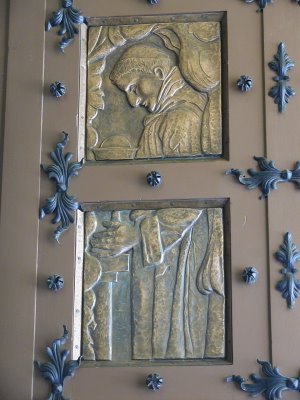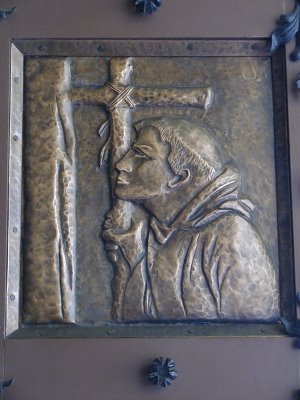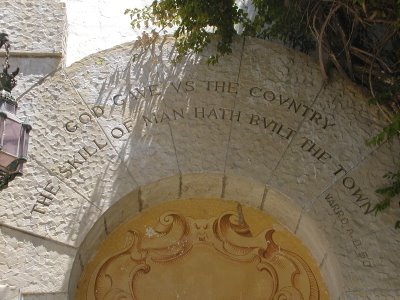On our recent vacation down California's central coast, we spent a couple of days in Santa Barbara. We noticed that the AAA Tour Book had bestowed one of its infrequent "Gem" ratings on the Santa Barbara county courthouse, so in our wanderings through town, we stopped there, curious why a courthouse should have earned such high marks.
What a place it turned out to be -- the kind of public building that everyone could agree upon not so long ago, but which now would be impossible get past the censors from the ACLU and People for the American Way. Built in gorgeous Spanish-colonial style in the 1920's, it's full of exquisite craftsmanship, yet it's not a museum piece; it's still very much a fully functional courthouse. The murals, metalwork, tilework and paintings are a constant and unabashed celebration of the brief history of the region -- all of it, not just the part that's politically correct to recall.
For instance, here in California, it's not fashionable to celebrate Blessed Fr. Serra's tremendous accomplishment in founding the California missions. Since white people and their influence are considered baneful here right now, the padres are seen as foreign invaders who ruined the idyllic lives of the indigenous tribes, enslaving them and infecting them with smallpox, probably on purpose, of course. So it was a refreshing surprise to see this on their courthouse doors:

which appears to be a priest with the chalice and host; or this:

which is Fr. Serra gazing at the Santa Barbara mission --
holding a cross.
PAW and ACLU members, step away from your speed dials. Touch these artworks, and it's war.
And then there's the City Council chamber, adorned with enormous murals on three walls, showing the founding of Mission Santa Barbara, mission life, and the coming of the Americans in 1846. Each group -- Indians, the padres, the Spanish settlers, and the Americans -- is depicted with dignity. I should add that the murals are done in the style of that great American illustrator of the early 20th century, N. C. Wyeth (though not, alas, by the man himself). Wish I could show you pictures, but mine were disappointing. You'll have to see the paintings for yourself.
And then there's this motto, sitting prominently above the main entrance (and repeated in Spanish nearby):

"God gave us the country; the skill of man hath built the town." (Varro, A.D. 50).
So, come to think of it, all of this together means that Santa Barbara's courthouse has more overtly Catholic imagery and more references to God than a certain pretend cathedral down the road in L.A.




